- Home
- Christine Morgan
The Raven's Table Page 5
The Raven's Table Read online
Page 5
And such an arrangement they had… large loom-frames, whole bundles of wool, a bin of flax-fibers, carding-combs, dozens of spindles. The finest was Nida’s, of course, of butter-smooth wood inlaid with whale-ivory. Ivory needles they had as well, and ones of bone, and of steel. Many of them wore silver scissors with their belt-keys. Boxes held thread-spools dyed many colors for embroidery.
Svein’s father Svenold and Nida’s two husbands before him had been prosperous men, not jarls but sea-lords, land-holders, traders and raiders. Thorbjorn was lucky to be Svein’s sworn man and friend.
“You see?” Nida led Sighilde to the biggest of the looms, and showed her the weights that hung from its bottom to keep the threads taut. These were not simple flat river-rocks bored through with holes, but polished soapstone disks that had been intricately worked with spiderweb designs.
“I do see,” Sighilde said, tracing the pattern with a fingertip. Spiders, too, she saw, had been carved into the outside frame. So had female figures, maidens with distaffs and spindles, hunch-backed crones carrying shears.
The women were more than glad for her continued company. The girls delighted to have a babe to play with and fuss over, far better than stuffed-cloth dolls. They imitated their mothers in other ways, some with their own spindles and needles, some helping with the weaving… even the smallest could clumsily card tufts of wool.
That night at the meal, Sighilde knew, when the harp was brought down from its peg on the wall, the songs that were sung and the tales that were told would be of warriors and kings, gods and great giants, monsters, adventure.
These, though, were of a far gentler bent. Hearth-and-home stories, love songs and romances. Sweet voices and light laughter filled the hall.
For the last, before they stopped to see to the cooking, Nida herself spoke, and recited to them the Saga of Coblis the Spider-Norn.
***
Once there was a young king, handsome and fair
With hair and beard the color of mead, honey-gold
His eyes blue and sparkling like the sun on the sea
A Norn saw and desired him, wanted him for her own
She promised him battle-glory, wealth and great fame
If he would be her husband and love her as a wife
Now, of the Norns, there are three Aesir best-known
Those who sit at the great ash-tree Yggdrasil’s deep roots
The Sisters, fate-spinners, weaving the world’s destiny
Urd is the eldest, whose name means fate-that-was
The second is called Verdandi, fate-that-now-is
And Skuld, the youngest and fiercest, fate-that-will-be
But there are more Norns than just the Three Sisters
Hosts of fate-spinners both good-natured and bad
Who attend the birth of each child to foretell its fate
Some are well-born, kind and generous elf-daughters.
They spin threads of silver and gold, bright fair colors
Weaving health and wealth and happiness into our lives
Others are low-born and cruel, wicked daughters of Dvalin
They spin the dark threads, the stain-dyed ones and ugly
Weaving fates of illness and injury, misfortune and woe
The Norn of this tale, Coblis, was of that latter sort,
A Spider-Norn, hairy, with eight legs and eight eyes
No wonder the young king should spurn and refuse her
And he already loved a fair and good maiden instead
A widow’s only daughter, sweet-spoken, beautiful but poor
Not for all the world’s wealth would he wed with another
The maiden asked just one favor before she’d consent
That her mother want for nothing and not be left alone
To go hungry in her humble hut; the king readily agreed
So it was that the old widow was brought into their house
Where she was well cared for, and treated with honor
Made to do no hard work and given soft wool to spin
The wedding day was held with great celebration
Feasting and gifts, the bride’s hair braided with blossoms
Jarls and lords as their guests, the kingdom rejoicing
In the due course of things, the queen bore a son
As she lay in her bed with her babe at her breast
A Norn came in to tell his fate… it was Coblis
The young queen, not knowing how this creature
Had been spurned by her husband, and made hateful
Asked the Norn if a favorable future awaited her child
“Do you see where your mother spins wool by the fire?
His life shall be only so long and strong as that thread.”
Upon hearing these words the queen burst into tears
But the old widow, with quick wisdom and cunning
Spun the skein’s end back upon itself, making a loop
And wove all the wool into it so that it was rope-strong
At this, Coblis was furious, but the fate had been set
From then on, no hurt or sickness could befall the boy
He led a charmed life, free from all misfortune
He grew to fine manhood, a prince among men
Noble, brave and handsome, his father’s true son
Showing his mother and grandmother utmost devotion
Then one day years later, as he was out hunting
The prince escaped unscathed from a murderous bear
And went to his mother, too amazed at his luck
“How is it that I have never once known injury,
Sickness or pain, hurt or weakening of any kind?
Not once, not a sniffle or scratch in all of my days?
“I have seen friends die in battle while I take no wound
My face stays unlined while I see theirs grow older
Who am I, what am I, god or man, how can this be so?”
She did not wish to answer, and tried to dissuade him
Persistent, he pressed her, and pleaded for the truth
Until at last her motherly heart had to relent
She told him how the Norn had come to her bedside
Making that cruel, grim prophecy of terrible fate
That his life would be only so long and strong as a thread
Then she told him how his grandmother, quick-thinking
Redoubled and spun the skein into a loop without end
And wove it stronger than ever, so that he would be safe
She showed him the loop, kept in a locked box of bronze
And implored him that he must tell no one this secret
He gave her his promise, swore her his most solemn vow
Then he went forth into the world and became a great hero
A fearless warrior and war-lord, undefeated, unaging
Armies fell before him and kings bowed their heads
Some years later, a woman entered into his life
A long-legged beauty, dark-haired and dark-eyed
Tall and graceful she was, most adept at weaving
The prince saw and desired her, wanted her for his own
But the more that he courted, the more she was coy
And the more her refusals increased his fascination
He went sleepless for days, ignoring all food and drink
His friends soon feared for him, his foes took delight
As he lost hope and joy, sinking into a deep, wretched state
Finally, when it seemed the prince must die from despair
The dark-eyed woman came to him and consented to be his
If he would ever be honest with her and never deceive
One night in their bed, she asked him how it could be
That he was so lucky, how he stayed so young and so fair
Remembering his promise, the prince would not answer
She petted him then and asked even more prettily
She wheedled, and pouted, and argued and begged
When none of these tactics could sway him, she wept
If he loved her, he’d share all of his secrets, she said
If he trusted her, she told him, he’d be truthful and fair
But if he thought so little of her, then away she must go
Worn down by her wiles, he confessed the whole story
Even that was not enough; she demanded more proof
He would have to let her see this loop with her own eyes
So he fetched from his father’s house the box of bronze
Unlocked it and opened it, and held it out in his hand
The endless wool thread that his grandmother had spun
But he had been tricked, seduced and misled by this witch
Who was no true woman, but the Spider-Norn’s daughter
Coblis’ child, sent to ensnare him for her mother’s revenge
From her black-hearted bosom she drew forth sharp shears
Snipped through the loop, laughing, then cut it to pieces
Then, to all their great sorrow, the prince fell down and died.
***
By morning, the grey rain had stopped and bright sunlight glistened gold on the green grass and leaves. A brisk breeze blew and birds twittered.
Sighilde had slept well and woke rested. She wondered now if her mind had made much of nothing, spun its own web of lies to let her think a few spiders were many.
She felt foolish for it. She was glad she’d not come raving and screaming to the door of Svein’s hall. Surely she would find, when she returned, that she’d imagined the extent of the spiders’ infestation, exaggerated it beyond reason.
Nida told her to visit again any time she liked, and did send Olaf and Ydris with her to help with the chores. They were stout folk, thralls, who’d worked Svein’s fields since Svein himself was a boy. Olaf had a broad back and bowed legs, a slow but hard worker. His wife Ydris was bony and thin, tireless.
As a further favor, Olaf carried a tied bundle of kindling-sticks and branches. Ydris carried the young cat Sighilde had chosen from the litter. It was a female of a goodly size, with a white streak down her nose, and of them all she’d been the one who least minded when Thorulf squealed in excitement and tugged on her tail.
The goats, due for their milking, bleated in their pen. The hens cackled and clucked. The cottage looked ordinary, not so much as a web-strand in sight. Wisps of steam rose from the thatch-roof as the warm sun dried the damp straw.
Sighilde felt more foolish yet when she went inside with Ydris and saw the state of housekeeping she’d left behind her when she fled.
Here was the milk-jug, overturned, the milk spilled and soured. There was the bread, left to first burn black then turn cold on the flat hearth-stones when the fire had gone out. Flies buzzed about the cook-pot. A brown rat had found a dropped piece of cheese; it ran, the rind gripped in its teeth. The cat sprang from Ydris’ arms, hissing, to give chase.
The thrall-woman said nothing, and no condemnation showed in her gaze, but Sighilde blushed with hot shame.
And there were no spiders.
None.
Even the dead ones, the ones she’d crushed, had disappeared. Nothing remained of them, not a stray leg, not a trace.
Could she have imagined it? Was she going mad?
She was sure, though… there must have been some spiders, at least!
With the diligent help of the thralls, the place was soon put to rights. Olaf milked the goats, fed the hens and collected their eggs, and hauled water by the bucketful until the barrel was full. Ydris took all the blankets outside to shake them in the fresh air, scoured the cook-pot and milk-jug, swept the packed-earth floor, ground some grain, and picked the ripe vegetables.
When they left to go back to Svein’s hall, Sighilde thanked them and bade them thank Nida again for her. Then they were gone, and she and Thorulf were alone.
Well, she and Thorulf and the cat, who’d proved her worth already by strutting in proudly with the dead rat clenched in her jaws.
They passed the rest of the day untroubled.
Had it been only some misplaced fear, some worry for Thorbjorn that took spider-shape? They’d not much been apart since they were married… and to know he was far from home… somewhere out on the wide sea or across it… well beyond her reach and entrusted only to the whims of his fate…
She would laugh about it with him later, how he’d told her she would manage well enough while he was away, unless there were more spiders.
Unless there were more spiders, indeed! His words were to blame for this brief affliction of terrors.
Dusk fell and darkness followed.
Sighilde put Thorulf into his cradle and went to bed. The cat sprawled at her feet, a warm, furry weight, rumbling a contented purr.
With a soft sigh, Sighilde shut her eyes, and went to sleep.
She woke to a hiss and low yowl, and the rustle of the cat jumping from the bed. After a short spate of scuffling sounds, a chittering and another hiss, all was silent. Sighilde was about to sit up and look when she felt the warm weight settle again at her feet.
She smiled. Spiders or no spiders, the cat would soon earn her keep in rats and mice.
The next time she woke, mere moments later it seemed, it was to a sudden pinching jab on her lower leg. A cat-claw, digging in; Sighilde muttered and nudged with her foot.
Then she felt another pinch, much sharper, on her thigh. She cried out and sat up, opening her eyes.
In the dim glow of banked coals, other eyes glinted back at her. A large, furry shape crouched over her knee.
If this was the cat’s notion of fun… true, the brief pain was gone now, but…
More than two eyes glinted back at her.
And the shape, the shape was wrong, not catlike at all. A fuzzy lump of a body hunkered on long, jointed legs.
Eight legs.
And eight eyes glinting.
A spider, a spider big as the cat was or bigger!
Her breath caught in her throat like cloth caught on a thorn.
The pain was gone from where it had bitten her, because her leg was numbed now from mid-thigh to toes. Numb and cold, numb and dead, as if she’d lain on it bent and caused it to lose all sensation. Which she had not done, and she knew it was because she’d been bitten. That jabbing pinch was from spider-fangs piercing her flesh.
She could see them, those fangs, curved ivory needles slick with blood and venom.
It grinned at her.
Coblis, she thought, it was Coblis or some daughter or servant of the Spider-Norn from Nida’s story. Coblis come to teach her a lesson or two about fate.
The thorn-caught breath tried to emerge in a scream and made only a shrill whimper. The Coblis-spider chittered as if in reply, the chittering she’d heard before and mistaken it for the cat pursuing some rodent.
The cat—?
Never mind the cat, the baby!
Sighilde twisted her body violently. Her numbed leg was deadweight, useless.
By that dim coal-glow, she still saw too well, saw the spiders descending on their unspooling threads, spiders from the thatch, coming down by the dozen.
Thorulf, in his cradle, oblivious, slept on.
The numbness had spread to her hip. She started nonetheless to get up and only succeeded in tumbling from the sleeping-platform, thumping heavily to the floor with furs and blankets tangled around her.
Coblis dropped down next to her, thin legs moving gracefully, almost prancing, almost dancing. Sighilde thrashed, struck at it, missed, struck at it again.
She felt the fangs plunge into the palm of her hand and the pain was as if she’d closed her fist around one of those hot coals. This scream was a scream, a shriek, and the baby shrieked too.
Her hand went numb, her arm went limp and flopped boneless against her chest.
Spiders lowered, slowly revolving, their shadows stretching oblong and strange on the cottage’s walls. Thorulf wailed and wailed, kicking in his cradle.
Then she felt the fangs again, sinking into her neck.
***
Thorbjorn’s strides, already swift and eager despite his welcome burden, sped up further when the cottage and yard came into view.
The sack on his back, bumping against the shield that he wore slung there—a shield with some cuts in the limewood and nicks in the iron rim—jingled with plunder and silver.
It had been a profitable journey.
As Svein had promised, they all came home rich men. Perhaps not rich as kings, but rich just the same.
“Sighilde!” he called, with loud and hearty good cheer.
She did not rush out to meet him, running to spring into his arms.
As he got closer, a puzzled frown began to replace his glad smile.
Was she not at home? Had she herded the goats to some upland valley to pasture? Had they gotten out and run off? For the goat-pen was empty… the only moving creature in sight was a half-grown cat that stared green-eyed at him from beneath a bush and then darted away into deeper hiding.
“Sighilde?” he called again.
But she still did not rush out, and there was still no answer.
No smoke curled up from the chimney-hole, no smells of bread or boiling meat wafted on the air. No babe cried. If not for the irritable cluck and flutter of hens in the henhouse he might have thought the place abandoned.
The honed instincts of battle made him set down the sack. He put on his helm—it, too, bore new nicks and dents and scratches, but better the helm than the head. He readied his shield onto his arm and drew his sword.
As he got closer, he saw a pallid, stringy fluff filling the cracks in the walls. He saw long wispy strands drifting lazily on the breeze. His nose wrinkled at a strange smell, something rancid and unplaceable.

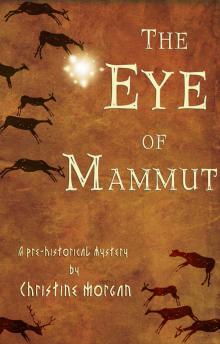 The Eye of Mammut
The Eye of Mammut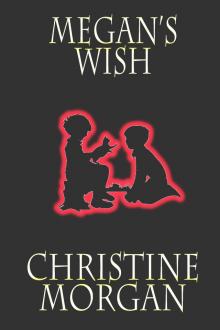 Megan's Wish
Megan's Wish Endless Miles
Endless Miles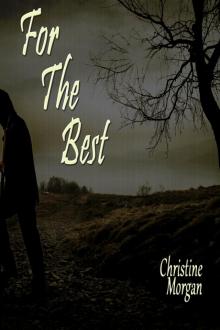 For The Best
For The Best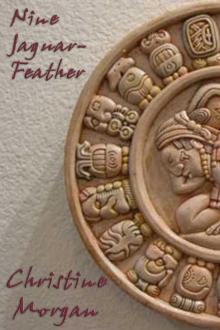 Nine Jaguar-Feather
Nine Jaguar-Feather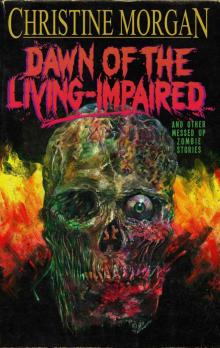 Dawn of the Living-Impaired
Dawn of the Living-Impaired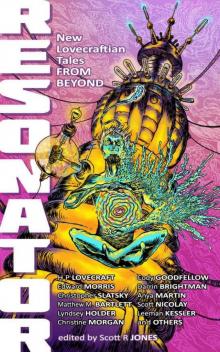 Resonator: New Lovecraftian Tales From Beyond
Resonator: New Lovecraftian Tales From Beyond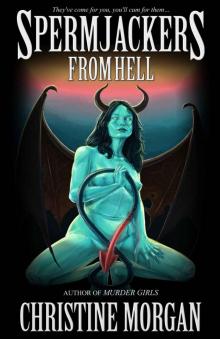 Spermjackers From Hell
Spermjackers From Hell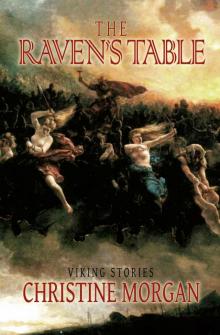 The Raven's Table: Viking Stories
The Raven's Table: Viking Stories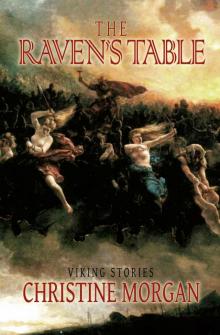 The Raven's Table
The Raven's Table